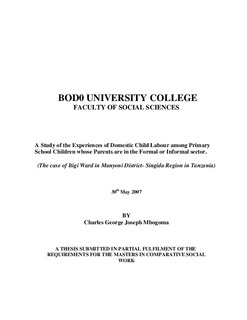| dc.description.abstract | The study aimed at developing an understanding of the attitudes and experiences of child
labour among the primary school children whose parents were in the formal or informal
sectors. It was hypothesized that the rights of the children were being abrogated and abused
through domestic and field labour and that children whose parents were in the formal or
informal sectors had different attitude and experiences toward the labour they performed.
Also, it was thought that Child labour might have different implications on the rights of the
child.
In Africa and Tanzania in particular child labour in all its forms is a burning issue requiring
attention for stakeholders. However, the attitudes of the children themselves towards such
Worst Forms of Child Labour- (WFCL) which they engage with have rarely been discussed.
This study has employed qualitative methods of research for collecting and analyzing the
data. Three categories were identified during data analyses which were useful for examining
the attitudes of the children towards the labour they performed. These are: first,
Institutionalization this embraces all the things that are related to Socialization and
Inculcation. That is the whole range of child development and care within and outside the
family institution. Also, the agro-pastoralist lifestyle subcategory came under the category of
institutionalization to entail the child labour phenomenon. Secondly, Welfare coping
strategies which entails the attitudes of the primary school children in relation to family size,
locality and the economy of the household; thirdly, Modernization and development in
which the consideration of the attitudes based on the desire to acquire things and participate in
modern social affairs, peer influences, and the emerging urban values.
It was found that the attitudes of the primary school children towards the WFL they
performed were embedded within the social institutions necessary for the welfare of the
family, household and the community. Itigi being among the emerging urban areas was found
to be hit by the forces of modernization and development which were also realized to have
negative impact and implication not only on the attitudes of the children but also on their own rights. In the course of development in the Tanzanian society, the processes of urbanization
and modernization were reported to be the main factors for children to engage in WFCL
leading to self abusing of their rights including that of accessing and getting formal education.
A combination of factors including poverty, ignorance, the diminishing role of the extended
family and many others, all resulting from the urbanization processes taking place in the area,
were reported to contribute to the abrogation of the rights of the children leaving them with
the WFCL as their last resort for their amenities.
There was a need to empower parents and families (kin, friends and neighbors) at large. These
are the frontier for the realization of the basic needs of children and hence, have the primary
responsibility to stop them from doing abusive domestic chores and heavy and disastrous field
activities. Social workers should find ways of combining the emerging categories so as to help
solving the persisting problem of Child Labour. | en |
